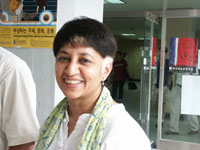|
Ph.D., University of California, Los Angeles; M.A., University of Bombay, B.A., Bangalore University.
Author of Siting Translation: History, Post-Structuralism and the Colonial Context (Berkeley: University of California Press, 1992); editor, with P.Sudhir and Vivek
Dhareshwar, Interrogating Modernity: Culture and Colonialism in India (Calcutta: Seagull, 1993); editor, with Seemanthini
Niranjana, Streevaadi Vimarshe, in Kannada (Bangalore: Kannada Sangha, Christ College, 1994); editor, special issues of the Journal of Arts and Ideas, "Careers of Modernity" (Nos.25-26, 1993), and "Gender, Media and the Rhetorics of Liberalization" (Nos.32-33, 1998). Currently coordinating the project on Gender and Modernity for
CSCS.
Recipient of a Sephis Postdoctoral Fellowship (1997-99) for a project on Mobilizing 'India': Gender and Ethnicity in Trinidad and South Africa; Sawyer Fellow, International Institute, University of Michigan (1996); Rockefeller Fellow, Program in Globalization and the Media, Chicago Humanities Institute, University of Chicago (1996); Homi Bhabha National Fellowship (1992-94). Central Sahitya Akademi Award for Best Translation into English (1993); Karnataka State Sahitya Akademi Award for Best Translation of 1994 (awarded in 1996).
Has published widely on cinema, translation theory and feminist theory. Lectured at universities in the West Indies, Brazil, South Africa, Hong Kong, Taiwan, Japan, the United Kingdom and the USA. Has taught at the University of Hyderabad and the University of Chicago.
|
|
Feminism and Cultural Studies in Asia
My presentation will attempt to sketch the interconnections between Cultural Studies (CS) and feminist critiques in non-Western contexts. Tracing the short history of CS as an emergent critical arena in India more specifically and Asia more generally can show us the extent of the CS debt to feminist scholarship and activism. Unlike in the UK, which is considered as having given rise to an important stream of Cultural Studies, CS in non-Western locations has not been "interrupted" by feminism. Rather, feminism is closely implicated in the political and disciplinary crises out of which CS emerges. We might want to ask what consequences this mapping of CS would have for our understanding of its present and future in Asia.
Ten years ago, I was inside the academy (teaching in the English Department of a major Indian university), but my practice was marginal to it, being the target of much hostility and suspicion. Today I find myself outside the traditional academy, located in a privately-funded research center, but able to intervene centrally in curricular issues across the humanities and social sciences. What has changed in the higher education scenario to make this possible?
How do we explain the widespread new desire for cultural studies? Are there new pressures on educational institutions to transform themselves? Would an account of these pressures have to deal with the social and political crises which are compelling us to go beyond conventional formulations of culture? How do we address these questions in designing new curricula?
|

